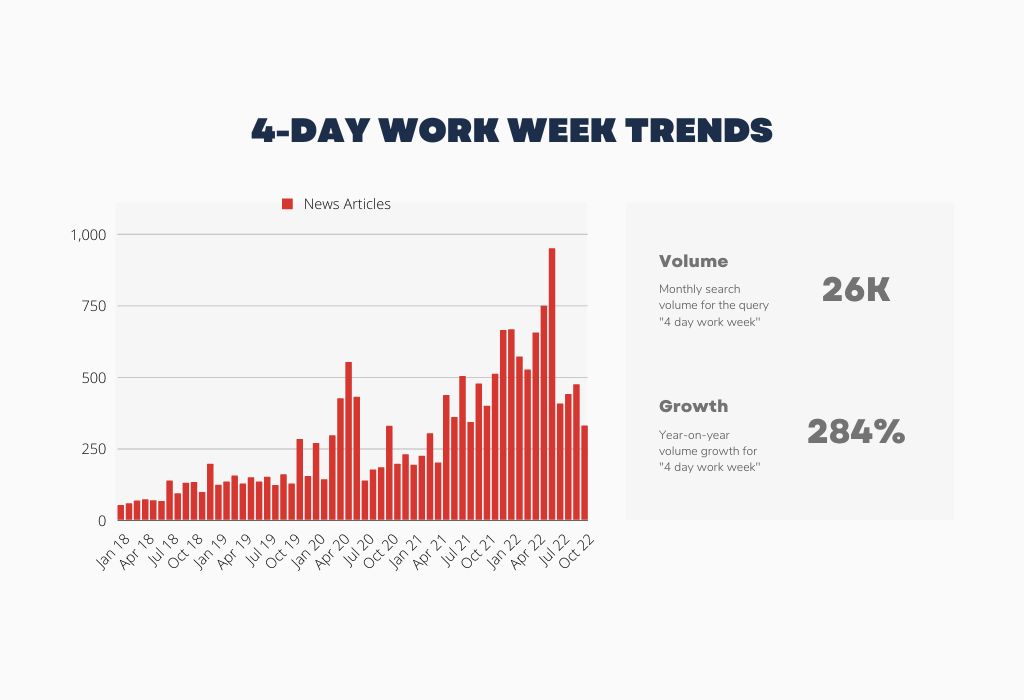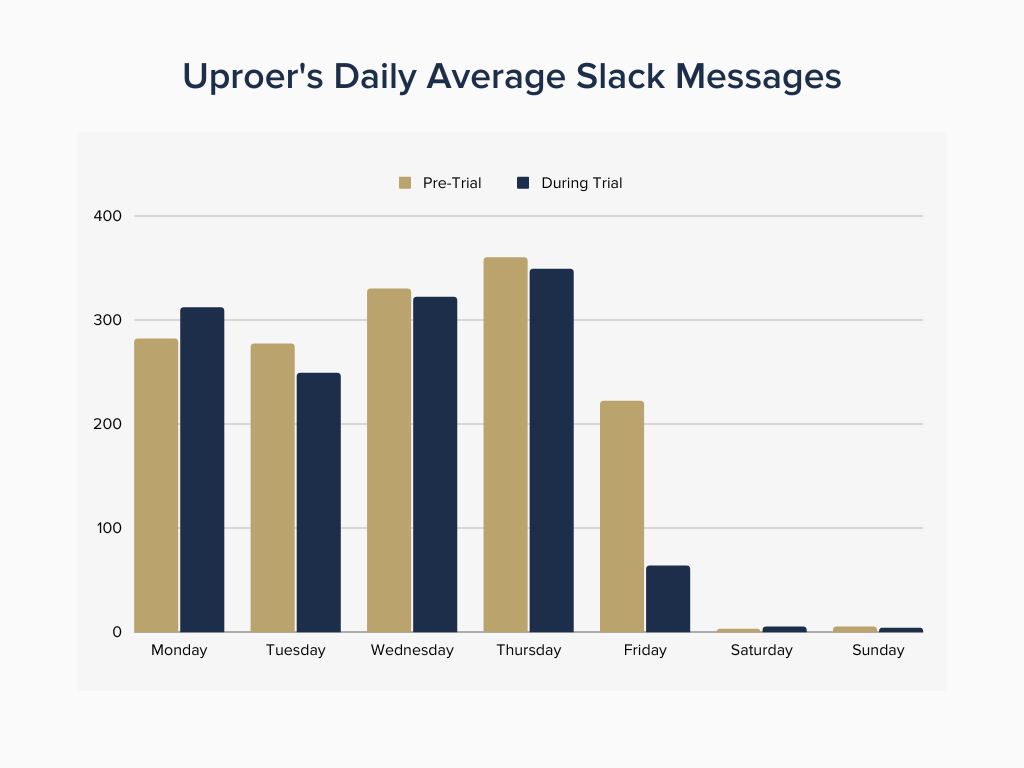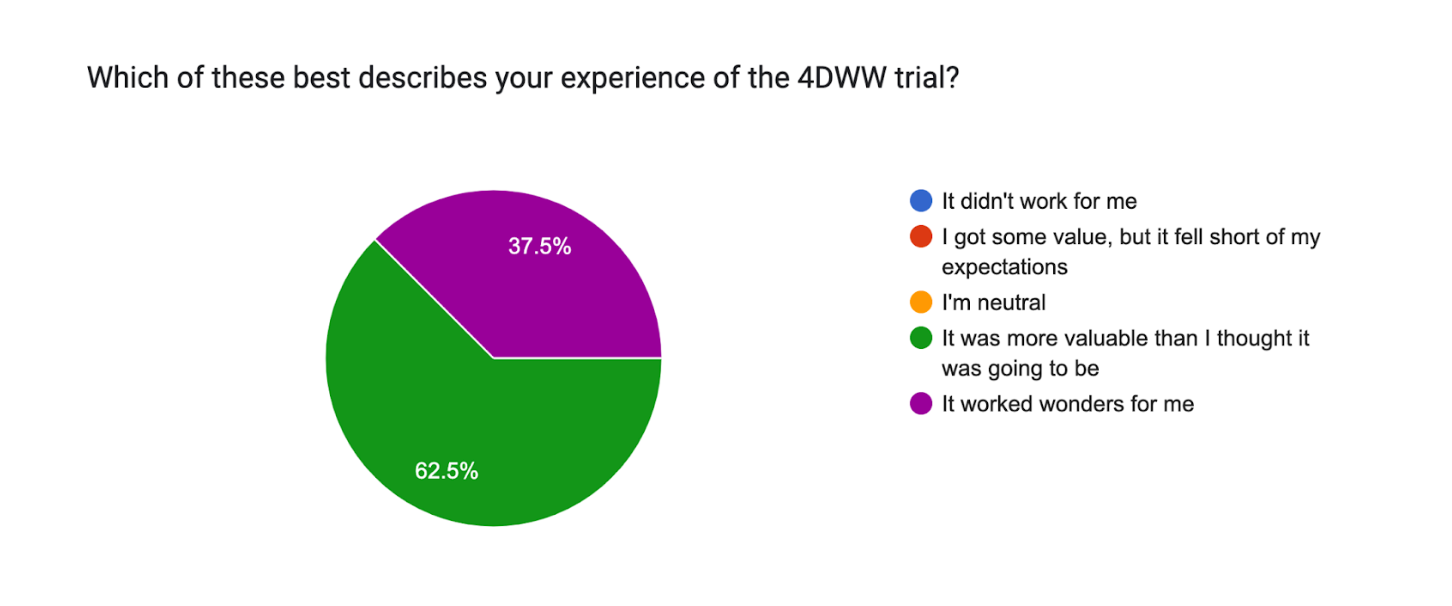Table of Contents
The COVID pandemic has forced many people to rethink accepted workplace policies. The 5-day, 40-hour work week is no exception. As more companies experiment with shorter work weeks, intriguing data is emerging that points to the productivity and stress benefits of working fewer hours.

As an agile company that prioritizes work-life balance, the Uproer team was interested in testing it out. So, for 6 weeks this fall, we worked a 4-day, 32-hour week. Was it successful? Yes. But, it wasn’t without unexpected learnings or new challenges:
- We saw an increase in productivity and better workload management, but working one less day wasn’t the only key to that success
- We learned that a shorter work week is not the end-all-be-all solution to stress management
- We surveyed six clients for feedback post-trial and none reported any disruptions or negative impact on their work with Uproer, but they raised great questions
In this article, we’ll go into detail about our experience trialing a 4-day work week (4DWW) and the learnings we’re carrying forward. Let’s dive in.
- How we prepared for a 4DWW
- What we learned during our 6-week trial
- Uproer’s new policy: Offline Fridays
- Our 4DWW advice to other service-based companies
How We Prepared for a 4DWW
For us, trialing a 4DWW wasn’t simply about taking Fridays off. We knew we had to gain efficiencies and improve work habits in order to compensate for having less time. This led us to establish the following hypothesis:
By becoming more intentional with how we spend our time, we can achieve the same level of productivity, if not better, in a 4DWW. And, the benefits of 3-day weekends will improve work-life balance.
Here are the steps we took leading up to our 4DWW trial:
- We developed time management guidelines, operational expectations, and a timeline for our trial and got buy-in from the team
- We surveyed our team to benchmark stress & productivity levels and identify opportunities to improve time management
- We shared the details of our trial with clients and set up Friday email auto-responders to remind anyone who might contact us on those days
- We began reorganizing our calendars and mentally preparing for the shift two weeks ahead of the start date
Once the trial got underway, we had proactive discussions on time management both in our weekly team meeting and one-on-one’s. Feeling prepared and having all team members on the same page was crucial to setting ourselves up for success during the trial.
What We Learned During Our 6-Week Trial
We observed improved productivity and better workload management
Our post-trial survey showed encouraging results. Uproerians reported improvements in focus, organization, and ability to complete their expected workload in a given week. We felt more productive, which was credited to being more intentional with time management.
Throughout the trial, we maintained normal timelines for deliverables and regular meeting cadences despite working six fewer days in total.
As the trial went on, we found that we became better at changing systems and habits that once worked for the 40-hour work week to make them more efficient for our new schedule. This showed us that as we continue to embrace a 4-day work week, we can continue to find more ways to improve productivity.
Committing to these two time management habits was key
We preach many helpful time management habits, but two stood out as the most impactful for productivity in a 4-day work week:
- Schedule time for workload planning
- Everyone was encouraged to block time on their calendars each day specifically to plan their time. Feeling more prepared translated into being more productive.
- Use Google Calendar to block time
- Being more intentional about our time naturally led to more consistent time blocking in GCal. Because we can all see each other’s calendars, this also helped to reduce unintended distractions from coworkers.
Internal communications on Slack decreased, even on Mondays through Thursdays
Slack is Uproer’s main internal communication channel. It wasn’t a shock to see our Friday Slack activity decline by 75% during the trial, but it was interesting to see that our Monday-through-Thursday messages decreased by 1%.

Instead of Friday communications shifting to the other days of the week, we saw a net decline in internal communications in Slack. Improved time management cut down on superfluous communications which contributed to our improved productivity.
We valued having a weekday with no obligation to be “online” (while having the choice to work some anyway)
75% of Uproerians reported working at least some amount on Fridays despite there being no expectation or obligation to. We valued the distraction-free time to focus on deep work, individual goals, or catch-up items. Most often, people reported working for 1 to 3 hours in the morning before getting their weekends started.
Although it’s great to see people making time management choices that best suit them, we are aware of the problem that could arise from people working Fridays while the company promotes a 4-day policy. We wouldn’t want any employees to perceive it as some “unwritten rule” that Fridays are actually work days. We knew we’d have to address this potential misconception in any policy we adopted going forward.
Self-reported stress levels did not improve much
Ahead of the 4DWW trial, our team reported moderate to low levels of stress. We did see slight improvement in the post-trial survey, but the 4-day work schedule didn’t move the needle like we thought it might.
Our main takeaway here is that a 4-day work week doesn’t take everyone to some work-life balance nirvana. Our plan is to continue to listen and test new things that can improve our approach to work.
“4-Day Work Week” does not have a universal definition
In talking with clients and colleagues about our trial, we found out that “4-day work week” has different meanings. Four 8-hour work days or four 10-hour work days? Fridays off for all staff or staggered 4-day shifts?
We learned that whatever policy we go forward with would benefit from a clearer name so that clients and prospective employees can quickly understand it.
Uproer’s New Work Policy: Offline Fridays
Everyone reported having a positive experience overall during the trial and a desire to continue forward with a version of a four-day workweek. Feedback from employees and clients helped us nail down the best policy for us: Offline Fridays.

Offlines Fridays: Our Expectations & Guidelines
- There is no expectation or obligation to work on Fridays.
- No internal or client meetings
- No internal communications
- We’re expected to work 32 hours between Monday through Thursday. We are generally available during regular business hours Monday through Thursday.
- When possible, we shift any non-work-related obligations to Fridays or outside normal business hours
- We have our following Mondays planned before the end of the day each Thursday
- We answer all communications from the week before the day ends on Thursdays
- We set up auto-responders on Fridays letting clients and partners know about our Offline Fridays policy
- We schedule time for daily/weekly workload planning. We’ll use Google Calendar to block time and Asana to manage tasks.
- You own your Fridays. You may choose to work on Fridays. If you do, you must adhere to the guidelines above.
Our Advice to Other Service-Based Companies
No two companies are the same, so there’s no one-size-fits-all solution for setting up a non-traditional work schedule. However, if you’re interested in exploring a solution like Offline Fridays, here’s our advice:
- Use data to make your decisions. We said we polled the team, and we continued to check in with them and our clients throughout the trial. Without these crucial data points, we would not have been able to see how effective our trial was. This leads us to our next piece of advice…
- Trial it. It may not work for your team at this time. We recommend 6 weeks with a few weeks to prep beforehand. And with any good test, be sure to reflect on what went right and what could be improved after it’s completed.
- You're going to need to change your systems and processes - you can't go into this thinking you can squeeze 40 hours of work into 32, or on the flip side, that you’re immediately going to not be working Fridays. This will take work and mindfulness in reducing inefficiencies both before and during your 4-Day Work Week.
- Set firm expectations with your team, but allow flexibility for your staff to get there on their own time. The biggest set of expectations to get right is around communications internally. We made sure that everyone knew that Fridays were off limits for comms unless previously organized, so everyone was on the same page and no one felt the need to be online.
- Communicate. Let your clients know and set firm boundaries to protect your team’s time. We felt that our client set would be ok with our 4 Day Work Week trial, but we still made sure to be over-communicative with them before and during our trial. We also made sure to let them know that if they emailed us on Friday, the earliest we could get back to them was Monday. This helped everyone reflect on their communication timing and develop better communication habits with clients and our team.
- Ask for client feedback and address concerns. We understand that as we shift more permanently to a 4-day week most of our clients are maintaining a 5-day week. Our clients asked great questions, like "What if there's a time-sensitive meeting and Friday is the only available time?" and "What if there's an emergency or an important initiative, like a site migration, on a Friday?". Fielding these questions allowed us to prepare answers for scenarios like these in our policy so our team is equipped to handle them.
Our Final Thoughts to Chew On
The nature of work is changing and as new generations enter the workplace, it’s becoming more important to continuously make intentional shifts in how work is executed to help your team grow and work together, no matter where you are. The final takeaway as we adopt our new Offline Fridays policy is that we don't view it as permanent. We may receive new data, new feedback, or see new trends that shift our thinking on how we best work. Ultimately, our focus is to provide clients with exceptional value while creating a healthy work environment. As our business and the industry evolve, we're expecting to revisit how we do that time and time again.

